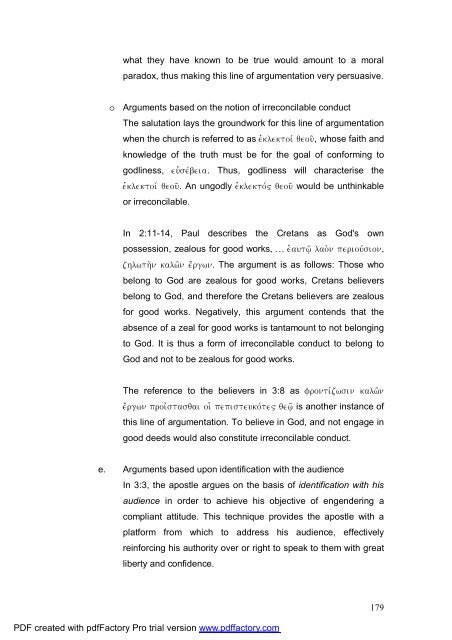A Text centred rhetorical analysis of Paul's Letter to Titus
A Text centred rhetorical analysis of Paul's Letter to Titus
A Text centred rhetorical analysis of Paul's Letter to Titus
You also want an ePaper? Increase the reach of your titles
YUMPU automatically turns print PDFs into web optimized ePapers that Google loves.
what they have known <strong>to</strong> be true would amount <strong>to</strong> a moral<br />
paradox, thus making this line <strong>of</strong> argumentation very persuasive.<br />
o Arguments based on the notion <strong>of</strong> irreconcilable conduct<br />
The salutation lays the groundwork for this line <strong>of</strong> argumentation<br />
when the church is referred <strong>to</strong> as ejklek<strong>to</strong>iv qeou`, whose faith and<br />
knowledge <strong>of</strong> the truth must be for the goal <strong>of</strong> conforming <strong>to</strong><br />
godliness, eujsevbeia. Thus, godliness will characterise the<br />
ejklek<strong>to</strong>iv qeou'. An ungodly ejklek<strong>to</strong>v~ qeou' would be unthinkable<br />
or irreconcilable.<br />
In 2:11-14, Paul describes the Cretans as God's own<br />
possession, zealous for good works, … eJautw`/ lao;n periouvsion,<br />
zhlwth;n kalw`n e[rgwn. The argument is as follows: Those who<br />
belong <strong>to</strong> God are zealous for good works, Cretans believers<br />
belong <strong>to</strong> God, and therefore the Cretans believers are zealous<br />
for good works. Negatively, this argument contends that the<br />
absence <strong>of</strong> a zeal for good works is tantamount <strong>to</strong> not belonging<br />
<strong>to</strong> God. It is thus a form <strong>of</strong> irreconcilable conduct <strong>to</strong> belong <strong>to</strong><br />
God and not <strong>to</strong> be zealous for good works.<br />
The reference <strong>to</strong> the believers in 3:8 as frontivzwsin kalw`n<br />
e[rgwn proivŸstasqai oiJ pepisteukovte" qew`/ is another instance <strong>of</strong><br />
this line <strong>of</strong> argumentation. To believe in God, and not engage in<br />
good deeds would also constitute irreconcilable conduct.<br />
e. Arguments based upon identification with the audience<br />
In 3:3, the apostle argues on the basis <strong>of</strong> identification with his<br />
audience in order <strong>to</strong> achieve his objective <strong>of</strong> engendering a<br />
compliant attitude. This technique provides the apostle with a<br />
platform from which <strong>to</strong> address his audience, effectively<br />
reinforcing his authority over or right <strong>to</strong> speak <strong>to</strong> them with great<br />
liberty and confidence.<br />
PDF created with pdfFac<strong>to</strong>ry Pro trial version www.pdffac<strong>to</strong>ry.com<br />
179

















